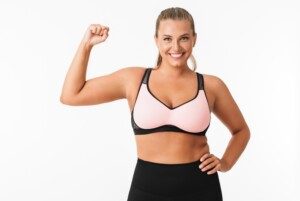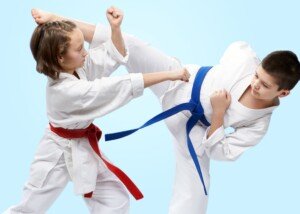Autistic adults need to get more active. Here are the ideal sports and physical activities for adults with Autism Spectrum Disorder.
It’s no secret that sedentary habits are more common in adults on the Autism Spectrum when compared to their neurotypical counterparts.
This is blatantly true even when we look at men and women with a mild form of autism and even a high IQ to go with it.
The irony is that the social awkwardness, that was caused by my autism, led me to wanting to get physically strong from lifting weights.
This solitary activity was a blessing because I never needed anyone else to do it with, and my physical strength felt compensatory for my social deficits.
Great Sports and Activities for Autistic Adults
Martial Arts
Martial arts isn’t just for children with ASD; it’s for adults, too, such as Span Chen, who was diagnosed with autism at age 28 but began martial arts training at 22.
“It was of great help to my autism,” says Span. “I didn’t know what to expect when I started; however, I have improved on my communication, eye contact, and my anxiety has reduced a lot,” explains Span, pictured below.
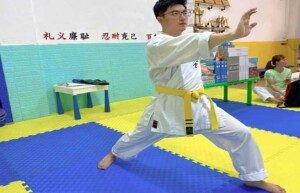
Span Chen performing a kata.
He adds that he felt a bit intimidated upon seeing kids training, believing he was too old to take up the discipline, “but I was able to overcome my fear when I started getting the hang of it,” says Span.
“I earned my first belt a month after. I was proud of my achievements. I took it one step at a time.
“I have no worries about being bullied in public, and people even rarely notice I have autism.
“When I first started karate training, I struggled with focus, coordination and balance.
“With consistent training, I was able to overcome my challenges of concentration through repetitive activities.
“It was a form of stress relief for me; I did more action than words, and it became easier to focus, channeling my energy on one thing at a time.
“Martial arts has helped me to multitask rather than being self-absorbed in one activity, negating other responsibilities.
“I have been able to manage a few things at the same time, not lose myself to a specific thought or activity so much that every other thing in my environment would completely be ignored.
“Martial arts has also made me expect the unexpected. I can easily sense people’s presence or gestures before they get to me, and I believe that training has brought me this far.”
When I took up martial arts for the first time, I was 21 and had no idea I was autistic.
But as an Autist, I found several features of martial arts quite alluring, and I’m sure that many Autistics would agree once they give karate, taekwondo, Kenpo, etc., a fair try:
• It’s extremely unlikely that instructors or students will ask why you “always look so serious.”
I’m not guaranteeing this won’t ever happen, but it’s LESS likely to occur in a karate studio when compared to other more mainstream venues such as the workplace and social functions.
It’s exceedingly unlikely you’ll hear “Smile! Things can’t be that bad!” inside a martial arts dojo!
• The training is all about being serious. You ARE expected to have a damn serious look on your face while in the midst of training exercises and drills.
You can wear your naturally serious, “expressionless” face in a martial arts class without feeling pressure to smile.
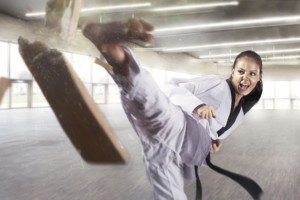
Shutterstock/Fotokvadrat
• Though you’ll be partnered up for drills and controlled sparring, your progress will be based on your individualism.
So, for example, if you’re clumsy, you won’t be compared to a more agile person, even in your own belt rank.
• Martial arts dramatically improves coordination.
• If you have a competitive spirit, you can compete in tournaments.
• Karate is a great way to improve eye contact. If yours is poor, don’t let this stop you from checking out a karate or taekwondo studio.
When I began training, I was told to maintain eye contact with my sparring partner, regardless of their belt rank – whether below me, equal, above or black belt. I’ve always been a “starer,” so that was no problem for me.
But if you’re an “averter,” you can explain your situation to the instructors, and they’ll help you work on this.
Sustaining eye contact during sparring will teach you to sense what your opponent’s body is doing, such as preparing to throw a kick, without looking at it.
You’ll even learn to block or evade kicks and hand strikes without looking at your partner’s legs or arms!
Holding eye contact during a sparring session will also conceal where you’re going to aim next.
All of this will increase your self-defense skills in a real-life situation in which you must protect yourself from harm.
You don’t want to be looking at where your next strike will be. Eye contact trains you to deliver and block strikes by instinct.
In my years of training, I’ve seen people with a variety of challenges study the martial arts, such as Down syndrome, blindness, seizure disorder, morbid obesity, deafness, old age. Don’t let ASD stop you from pursuing martial arts!
Powerlifting
Powerlifting is one of the few sports where a woman isn’t expected to smile and can get away with a resting bitch face. And there’s more…
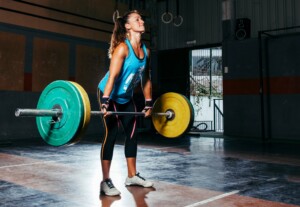
The deadlift. Freepik.com
For those with a competitive spirit, you can enter powerlifting contests regardless of your strength, body weight or age, because competitions have age and weight brackets.
Next, you can train without interacting with other people. If you choose to compete, your interaction with other people is limited.
In a powerlifting competition, you’ll have two spotters for two of the three events. However, social interaction with those spotters is nominal.
And it’s nearly guaranteed that nobody will tell you to smile or otherwise negatively comment on your social habits.
The three events in powerlifting are the deadlift, back squat and bench press. You can train all by yourself at a standard gym.
Nobody will bother you. When a man or woman is using a powerlifting station, people leave them alone. I speak from experience, having performed these exercises for many years.
You can have the bitchiest resting face and nobody will dare challenge you about it, even if your barbell is very light.
In addition, nobody expects men and women who train hard with barbells to suddenly stop and make small talk with other gym members.
Another plus that this sport has for autistic people is that it requires minimal coordination. You simply learn proper form.
Powerlifting is an endeavor that you can do lifelong with great efficiency — even if you don’t care to compete. Even an old, stiff body that can’t run well can still powerlift.
Indoor Wall Climbing
Many autistic people love to analyze problems and come up with solutions. This is precisely what rock-wall climbers do.
You may very much enjoy studying a climbing route and then applying what you’ve analyzed once you begin climbing. Think of this as playing chess on a wall.
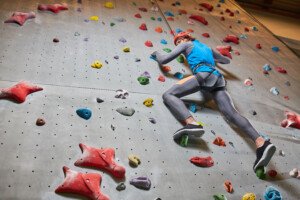
Freepik.com/pressfoto
I used to climb a lot at a local gym, and the analysis aspect of it had great appeal to me.
• Virtually no coordination is required, even if you “boulder” or “traverse” (ropeless climbing at a lower height).
• Though “top roping” requires a partner, bouldering/traversing and “leading” do not.
• Climbing gyms are full of helpful people. If you’re new and are seen struggling on a route, someone may approach and offer guidance.
• An autistic person can become enthralled by bouldering and spend quite a bit of joyful time analyzing different ways to traverse a specific route.
• Routes are color coded, ranging from very easy to very advanced.
• Women can learn to climb quite superbly, as this sport is not contingent upon upper body strength.
• The one drawback I can think of is that some gyms play loud music. I wore earplugs.
Hiking
Jeff and Will Marinac, 28 (as of 2022), have pronounced autism yet have been hiking since age seven – a lifelong enthusiasm that kind of happened by accident when their parents decided, on a whim, to take the boys and their neurotypical sister on a hiking trail for the first time.
The brothers have been hooked since, and are accomplished hikers who have summited, with their parents, a vast array of mountain peaks.
• Even if you feel that your body is “out of shape,” there’s a hiking trail ideal for your current level of conditioning.
• If you’d like company when hiking, though, there may be a hiking group in your area. There may also be scheduled groups via your city’s recreation center. You can also connect via FB.
• If “feeling different” all your life has been a thorn in your side, then this feeling will be decimated the moment you reach the top of a mountain and can see for miles around the earth below you.
Your ability to appreciate spectacularly majestic views is no less than that of a neurotypical.
You may even develop a new special interest from hiking.
After I joined a mountain club and was required to pass a wilderness trekking school course (classroom and in the field) in order to qualify for advanced hikes, I became fascinated by hypothermia. And I mean really fascinated.
Additional Sports that Are Ideal for Those on the Spectrum

©Lorra Garrick
There are quite a few others, such as muscle building and strength training, bowling, jogging, triathlons, yoga, swimming, inline skating and mountain biking.
The bottom line is that, quite bluntly, ASD is absolutely NO excuse to be sedentary and out of shape.
A regular exercise or physical activity program will have a soothing effect and improve mental health.
It’s something you’ll want to strongly consider doing after work instead of going to some social event (such as to a bar) with neurotypical coworkers who make you feel that you must continuously mask to fit in.
Instead, head to a gym or rec center and take some fitness classes. If the noise is too much, then go on a hard brisk walk holding small hand weights, or start doing some yoga or strength training in your living room.
Autistic people deserve to be lithe, swift and strong as much as do neurotypicals!
 Span Chen is a martial arts enthusiast and founder of The Karate Blog.
Span Chen is a martial arts enthusiast and founder of The Karate Blog.
 Lorra Garrick has been covering medical and fitness topics for many years, having written thousands of articles for print magazines and websites, including as a ghostwriter. She’s also a former ACE-certified personal trainer. In 2022 she received a diagnosis of Level 1 Autism Spectrum Disorder.
Lorra Garrick has been covering medical and fitness topics for many years, having written thousands of articles for print magazines and websites, including as a ghostwriter. She’s also a former ACE-certified personal trainer. In 2022 she received a diagnosis of Level 1 Autism Spectrum Disorder.
.
Top image: Freepik.com/garetsvisual
Do ALL Autistic People Have Impairment with Executive Function?
Free Service Helps Autistic People Find Inclusive Employment
Autistic Man Builds Muscle Lifting Weights; has Fitness Site
Can Autism Be Ruled Out if the Patient Has Good Eye Contact?

